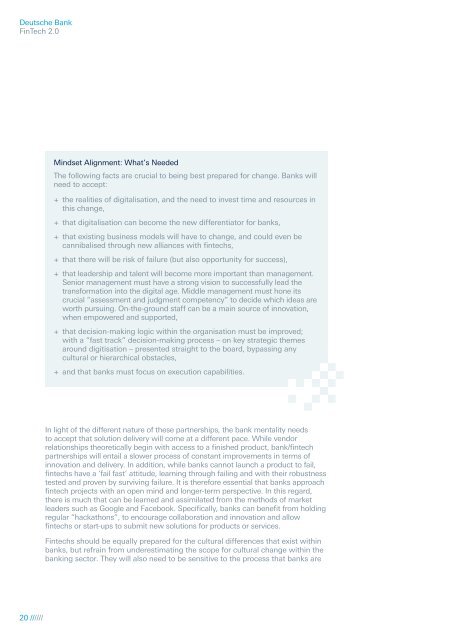FinTech 2.0
YKHHI
YKHHI
Create successful ePaper yourself
Turn your PDF publications into a flip-book with our unique Google optimized e-Paper software.
Deutsche Bank<br />
<strong>FinTech</strong> <strong>2.0</strong><br />
Mindset Alignment: What’s Needed<br />
The following facts are crucial to being best prepared for change. Banks will<br />
need to accept:<br />
+ + the realities of digitalisation, and the need to invest time and resources in<br />
this change,<br />
+ + that digitalisation can become the new differentiator for banks,<br />
+ + that existing business models will have to change, and could even be<br />
cannibalised through new alliances with fintechs,<br />
+ + that there will be risk of failure (but also opportunity for success),<br />
+ + that leadership and talent will become more important than management.<br />
Senior management must have a strong vision to successfully lead the<br />
transformation into the digital age. Middle management must hone its<br />
crucial “assessment and judgment competency” to decide which ideas are<br />
worth pursuing. On-the-ground staff can be a main source of innovation,<br />
when empowered and supported,<br />
+ + that decision-making logic within the organisation must be improved;<br />
with a “fast track” decision-making process – on key strategic themes<br />
around digitisation – presented straight to the board, bypassing any<br />
cultural or hierarchical obstacles,<br />
+ + and that banks must focus on execution capabilities.<br />
In light of the different nature of these partnerships, the bank mentality needs<br />
to accept that solution delivery will come at a different pace. While vendor<br />
relationships theoretically begin with access to a finished product, bank/fintech<br />
partnerships will entail a slower process of constant improvements in terms of<br />
innovation and delivery. In addition, while banks cannot launch a product to fail,<br />
fintechs have a ‘fail fast’ attitude, learning through failing and with their robustness<br />
tested and proven by surviving failure. It is therefore essential that banks approach<br />
fintech projects with an open mind and longer-term perspective. In this regard,<br />
there is much that can be learned and assimilated from the methods of market<br />
leaders such as Google and Facebook. Specifically, banks can benefit from holding<br />
regular “hackathons”, to encourage collaboration and innovation and allow<br />
fintechs or start-ups to submit new solutions for products or services.<br />
Fintechs should be equally prepared for the cultural differences that exist within<br />
banks, but refrain from underestimating the scope for cultural change within the<br />
banking sector. They will also need to be sensitive to the process that banks are<br />
20 //////


